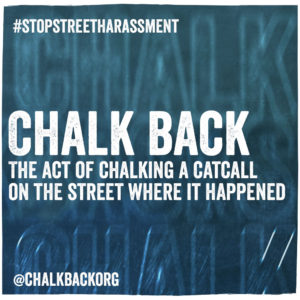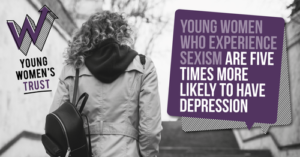He Killed Her For Ignoring His Advances
First, you haven’t heard from me in a while as my time away from my day-job has been focused on caring for my toddler while he’s been in and out of the hospital, facing repeat illnesses and requiring many doctor and specialist visits. I still try to post relevant news stories regularly on our Facebook page, and the free street harassment support hotline is still available 24/7 (and is what your donations can help continue to fund).
 But here I am writing to you today because this news story shook me — a 19-year-old honors college student named Ruth George was killed by a man in Chicago after she ignored his “catcalls” and verbal harassment. At the time, she was walking near campus to her car in a parking garage and, angry that she ignored him, he followed her, strangled her, raped her and left her dead in the backseat of her car.
But here I am writing to you today because this news story shook me — a 19-year-old honors college student named Ruth George was killed by a man in Chicago after she ignored his “catcalls” and verbal harassment. At the time, she was walking near campus to her car in a parking garage and, angry that she ignored him, he followed her, strangled her, raped her and left her dead in the backseat of her car.
The brutality of his actions are shocking. The normalcy of what she was doing when this occurred – just walking to her car from her campus – is scary. My heart goes out to her family and friends. This never should have happened.
Over the 13 years I’ve been researching and writing on this issue, I’ve read at least two dozen of these stories. Usually the man is mad the woman ignored him and he escalates to lethal violence. That similarity comes up over and over again. It makes me think — How many times have we all been told to ignore someone who was bullying or harassing us? It’s still pretty common advice even though obviously there is no guarantee that it will keep you safe — indeed instead research suggests that a calm, short, assertive response may be the best strategy.
What Ruth’s tragic story also makes clear is that telling people how to respond to their harassers will not end this problem. Instead, we need to focus on ending the systems, attitudes and culture that allows harassment and violence to occur in the first place. We need communities involved. We need to listen to the voices of those most affected, including girls and teenagers.
Recent Examples of What We Need:
1 – As a long-time runner whose faced countless incidents of harassment, I am proud to be part of the current November Runner’s World issue that focuses on what communities can do about stopping the harassment of runners. As announced in the issue, Runner’s World and Women’s Health have a new initiative to address this called Runners Alliance.
 2 – Many of the community tactics Runner’s World covers in this article are applicable to street harassment in general, including the efforts of organizations like Men Can Stop Rape and Collective Action for Safe Spaces (CASS).
2 – Many of the community tactics Runner’s World covers in this article are applicable to street harassment in general, including the efforts of organizations like Men Can Stop Rape and Collective Action for Safe Spaces (CASS).
3 – Here in Washington, DC, thanks to CASS and others, our city government is tackling this issue in a holistic way, with a city-wide survey and PSAs being two of the outcomes so far. Our transit agency is too, and our latest joint campaign that’s up on the system focuses on what witnesses of harassment can do.

 4 – Plan International is currently undertaking a Chalk Back for young women around the world to raise awareness about street harassment, as part of the current 16 Days of Activism Against Gender-Based Violence.
4 – Plan International is currently undertaking a Chalk Back for young women around the world to raise awareness about street harassment, as part of the current 16 Days of Activism Against Gender-Based Violence.
Additionally, of course, ideally we need lessons on sexual harassment and consent in schools and we need politicians/celebrities/public figures to treat women with respect and consent.
What will you do to advocate for and help create a safer community for all?
-Holly
Stop Street Harassment Founder & CEO
P.S. Please consider a tax deductible-donation to support our work.
“Like a wolf who wanted to devour a smaller, weaker animal”
I was on vacation and in a mall in Salt Lake City with my family. I don’t remember exactly how old I was, probably around 12. A guy who was much older than me (teens or early 20s? It’s hard to say now looking back; all I knew at the time was that he was much older than me) saw me in a store and began staring at me in a creepy way. I believe he was with a friend or two. Then he proceeded to follow me –remember, I was with my family, including my father who is an extremely tall and intimidating man –around the mall for an uncomfortably long time, all the while giving me the same creepy stare, like a wolf who wanted to devour a smaller, weaker animal.
I still remember his face and my growing panic. It was terrifying because even the fact that I was with my mother, father and sister didn’t deter him from stalking me. He eventually lost interest, but I’ll never forget my terror. I had no idea what was going on. I was pre-pubescent and still looked very much like a child; at that time, I did not, in any way, think of myself as being attractive to anyone of the opposite sex, so I did not understand what was happening.
– Anonymous
This post is part of a back-to-school series to highlight the young age that street harassment begins. The stories in this series were shared as part of our recent survey on street harassment and age and they entail people’s first experience of street harassment. The full list of stories is available here.
As you read the stories, note that among respondents, 70% said they were 13 years old or younger at the time of their first experience. 24% said they were 14 to 16 years old. The remaining 6% were older than 16.
Need support?
Call the toll-free National Street Harassment hotline: 855-897-5910
“A construction worker wolf-whistled at me as I walked to the bus stop to go to school”
I was with my mom at a drugstore getting my thyroid prescription and someone my mom knew from somewhere approached us and made uncomfortable comments as he engaged us in conversation. At about the same time, a construction worker wolf-whistled at me as I walked to the bus stop to go to school.
– Anonymous
This post is part of a back-to-school series to highlight the young age that street harassment begins. The stories in this series were shared as part of our recent survey on street harassment and age and they entail people’s first experience of street harassment. The full list of stories is available here.
As you read the stories, note that among respondents, 70% said they were 13 years old or younger at the time of their first experience. 24% said they were 14 to 16 years old. The remaining 6% were older than 16.
Need support?
Call the toll-free National Street Harassment hotline: 855-897-5910
“I was 12”
I was in middle school, walking home from school, and a bunch of men in a work truck drove by and stuck their heads out of the windows and cat called me. I was 12.
– Anonymous
This post is part of a back-to-school series to highlight the young age that street harassment begins. The stories in this series were shared as part of our recent survey on street harassment and age and they entail people’s first experience of street harassment. The full list of stories is available here.
As you read the stories, note that among respondents, 70% said they were 13 years old or younger at the time of their first experience. 24% said they were 14 to 16 years old. The remaining 6% were older than 16.
Need support?
Call the toll-free National Street Harassment hotline: 855-897-5910

